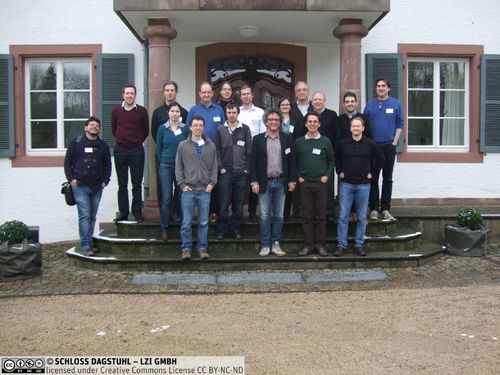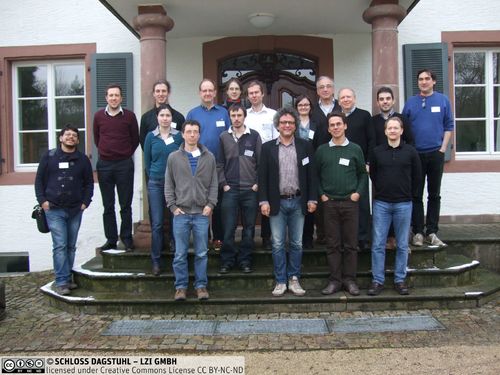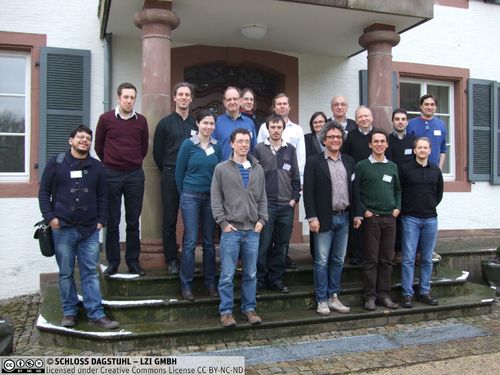Dagstuhl Seminar 15042
Coalgebraic Semantics of Reflexive Economics
( Jan 18 – Jan 21, 2015 )
Permalink
Organizers
- Samson Abramsky (University of Oxford, GB)
- Alexander Kurz (University of Leicester, GB)
- Pierre Lescanne (ENS - Lyon, FR)
- Viktor Winschel (Universität Mannheim, DE)
Contact
- Susanne Bach-Bernhard (for administrative matters)
A growing number of researchers have been discovering analogies in the foundations of both computer science and economics. The goal of this seminar is to interface computer science with economics and game theory and to take advantage of the programming language semantics methods in theoretical computer science based on lambda calculus, coalgebras, modal logic and category theory.
Background The theoretical thread of interest to this seminar and common to both computer science and economics is the phenomenon that may be circumscribed by notions such as reflexivity, self-reference, impredicativity, infinite regress, recursion, or fixed points.
In computer science, the phenomena of self-reference, self-application and recursion played a crucial role in the foundational work of Godel, Church, Turing and Kleene in the 1930s. Nevertheless, powerful mathematical models of the semantics of recursion became available only with the work of Scott on models of the untyped lambda calculus and subsequent research in domain theory. The combination of domain theory with the theory of types in programming languages and their categorical semantics has led to the development of a powerful tool box. More recently, this tool box has been further strengthened by advances in coalgebra. It provides for a wide variety of dynamic systems the mathematical tools of (bi)simulation and coinduction as well as a variety of techniques from category theory.
In economics, and the social sciences more generally, reflexivity arises from the obvious fact that cognitive agents reason about themselves, others and the society they live in. This leads to self-reference and recursion in, for example, theories of belief formation as beliefs of beliefs (Harsanyi type spaces) or theories of institutions as rules to change rules. More generally, a social system consists of individuals who are learning about a process in which others are learning as well. Learning the state of an interactive system is therefore rather different compared to learning the parameter values that govern a physical process. When the observer is a part of the system, the act of learning changes the thing to be learned. The traditional mathematical tools in economics are hardly suited to solve these problems in a sufficiently general way and they make it difficult for computer scientists, once they need to solve similar or common problems, to understand the problem formulation and the solutions already achieved by economists.
Objectives and research topics The specific subfields of computer science and economics discussed above suggest to explore methods of program semantics and category theory in general and, in particular, of bisimulation and coinduction in economics. Furthermore, coalgebra gained prominence as providing models for concurrency, a topic that has hardly been touched upon in economics explicitly, even so it underlies the most general kind of issues in economics, namely those regarding centralization versus decentralization in theories of economic systems, administration, firms and markets.
Particular topics in which we see scope for methods from the semantics of programming languages include infinitely repeated games, econometrics and system theory, epistemic game theory and interactive learning in multi-agent systems.
More generally, research in program semantics and logics in computer science is typically motivated by problems arising in programming languages and software engineering. In one direction, economic modeling will become more important in software engineering. In the other direction, computational economics may as well profit from a modern approach to language design not only in terms of reflexivity at the theoretical level but also at the practical level of modeling software.
A growing number of researchers have been discovering analogies in the foundations of both computer science and economics. The goal of this seminar is to interface computer science with economics and game theory and to take advantage of the programming language semantics methods in theoretical computer science based on lambda calculus, coalgebras, modal logic and category theory.
The theoretical thread of interest to this seminar and common to both computer science and economics is the phenomenon that may be circumscribed by notions such as reflexivity, self-reference, impredicativity, infinite regress, recursion, or fixed points.
In computer science, the phenomena of self-reference, self-application and recursion played a crucial role in the foundational work of Gödel, Church, Turing and Kleene in the 1930s. Nevertheless, powerful mathematical models of the semantics of recursion became available only with the work of Scott on models of the untyped lambda calculus and subsequent research in domain theory. The combination of domain theory with the theory of types in programming languages and their categorical semantics has led to the development of a powerful tool box. More recently, this tool box has been further strengthened by advances in coalgebra. It provides for a wide variety of dynamic systems the mathematical tools of (bi)simulation and coinduction as well as a variety of techniques from category theory.
In economics, and the social sciences more generally, reflexivity arises from the obvious fact that cognitive agents reason about themselves, others and the society they live in. This leads to self-reference and recursion in, for example, theories of belief formation as beliefs of beliefs (Harsanyi type spaces) or theories of institutions as rules to change rules. More generally, a social system consists of individuals who are learning about a process in which others are learning as well. Learning the state of an interactive system is therefore rather different compared to learning the parameter values that govern a physical process. When the observer is a part of the system, the act of learning changes the thing to be learned. The traditional mathematical tools in economics are hardly suited to solve these problems in a sufficiently general way and they make it difficult for computer scientists, once they need to solve similar or common problems, to understand the problem formulation and the solutions already achieved by economists.
The specific subfields of computer science and economics discussed above suggest to explore methods of program semantics and category theory in general and, in particular, of bisimulation and coinduction in economics. Furthermore, coalgebra gained prominence as providing models for concurrency, a topic that has hardly been touched upon in economics explicitly, even so it underlies the most general kind of issues in economics, namely those regarding centralization versus decentralization in theories of economic systems, administration, firms and markets.
Particular topics in which we see scope for methods from the semantics of programming languages include infinitely repeated games, econometrics and system theory, epistemic game theory and interactive learning in multi-agent systems.
More generally, research in program semantics and logics in computer science is typically motivated by problems arising in programming languages and software engineering. In one direction, economic modeling will become more important in software engineering. In the other direction, computational economics may as well profit from a modern approach to language design not only in terms of reflexivity at the theoretical level but also at the practical level of modeling software.
 Samson Abramsky and Jules Hedges and Alexander Kurz and Pierre Lescanne and Viktor Winschel
Samson Abramsky and Jules Hedges and Alexander Kurz and Pierre Lescanne and Viktor Winschel
- Samson Abramsky (University of Oxford, GB) [dblp]
- Achim Blumensath (TU Darmstadt, DE) [dblp]
- Filippo Bonchi (ENS - Lyon, FR) [dblp]
- Neil Ghani (University of Strathclyde, GB) [dblp]
- Helle Hvid Hansen (Radboud University Nijmegen, NL) [dblp]
- Michael Hauhs (Universität Bayreuth, DE) [dblp]
- Jules Hedges (Queen Mary University of London, GB) [dblp]
- Alexander Kurz (University of Leicester, GB) [dblp]
- Stéphane Le Roux (University of Brussels, BE) [dblp]
- Pierre Lescanne (ENS - Lyon, FR) [dblp]
- Fabio Mogavero (University of Naples, IT) [dblp]
- Paulo Oliva (Queen Mary University of London, GB) [dblp]
- Prakash Panangaden (McGill University - Montreal, CA) [dblp]
- Daniela Petrisan (Radboud University Nijmegen, NL) [dblp]
- Marcus Pivato (University of Cergy-Pontoise, FR) [dblp]
- Jan Rutten (CWI - Amsterdam, NL) [dblp]
- Martin Scheffel (Universität Köln, DE)
- Heiner Schumacher (Aarhus University, DK) [dblp]
- Alexandra Silva (Radboud University Nijmegen, NL) [dblp]
- Baltasar Trancon y Widemann (TU Ilmenau, DE) [dblp]
- Elias Tsakas (Maastricht University, NL) [dblp]
- Evguenia Winschel (Universität Mannheim, DE) [dblp]
- Viktor Winschel (Universität Mannheim, DE) [dblp]
- Philipp Zahn (Universität Mannheim, DE) [dblp]
Classification
- semantics / formal methods
Keywords
- programming language semantics
- coalgebra
- category theory
- economics
- epistemic game theory




 Creative Commons BY 3.0 Unported license
Creative Commons BY 3.0 Unported license
